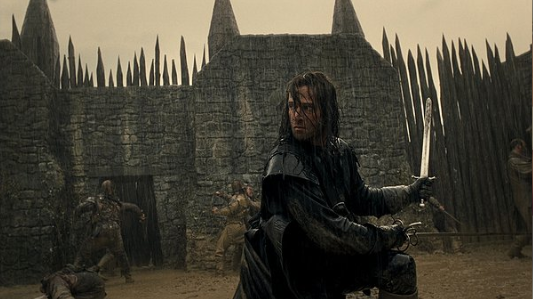Directed by Michael J. Bassett
Written by Michael J. Bassett, Robert E. Howard
France/Czech Republic/UK, 2009
Solomon Kane is lugubrious, inclement, drab, dour, dark, violent and macabre. The eponymous character, played by James Purefoy, epitomizes all of the above and is very much the same. Having had its world premiere at the Toronto International Film Festival in 2009, the movie will make its limited US release almost three years later, presumably to bated and frosty breath.
Set in the 1600’s, the movie opens up with Solomon Kane in North Africa, as a ruthless mercenary hell-bent on imagined riches and bounty. Following another one of his pillages, Solomon finds himself in a room with a demon. After a short lecture about how he is bound for hell because of his evil deeds, the demon engages him in a fiery sword fight, which Solomon is able to escape from.
Back in England, Solomon repudiates his barbarous past, vowing to live a life of peace. Travelling with a family of puritans, his pacifism is challenged when the Masked Rider (a lieutenant to the evil sorcerer Malachi) and his minions confront the group with malicious intent. After a bloody fracas, where some of the family is killed, the daughter Meredith (Rachel Hurd-Wood) is kidnapped. With his dying breath, the father (Pete Postlethwaite) tells Solomon that his soul will be vindicated if he saves her. So, armed with that knowledge, Solomon embraces violence once again, to save Meredith and for self-redemption.
Laced with religious undertones, Solomon Kane, however, is rather ambivalent with its moral message. Although a pretty crucial commandment, ‘thou shall not kill’ is interpreted in rather loose terms here, and by the end of the of the movie, Solomon is the same sword-weilding slayer he was at the beginning. The only difference is that he’s now killing for ‘virtuous’ reasons, which is a very Old Testament approach to conflict resolution.
If one were to ask Jesus what he’d do in Solomon’s situation, he probably wouldn’t answer ‘decapitation’. ‘Turn the other cheek’ need not apply to Solomon Kane, both movie and character, which makes everything he does feel decidedly un-Christian; which would’ve been fine if it didn’t insist on being so religiously infused (Solomon actually gets crucified at one point).
Adapted from the pulp magazine by Michael J. Bassett, Solomon Kane lacks the certain guilty-pleasure-feel of the genre, going for a more straightforward approach. The movie is devoid of any cheek or levity, and becomes a tad monotonous when not punctuated by crushing and bloody action sequences (of which there are many). The atmosphere is appropriately drab, with perpetual rain and gloom, and there’s some solid acting all-around.
Ultimately, though, Solomon Kane is weighed down by its exceedingly morose and self-serious tone, making its lofty ambitions to be an epic form of escapism a counter-intuitive one. The story is fairly easy to follow, if not as easy to care about, and ends on a promise of more to come. Slated to be the first in a trilogy, the US release of Solomon Kane was held back three years after its initial premiere, stifling the progress of future installments for the time being. If the first movie is anything to go by, maybe this is some kind of celestial sign.
– Justin Li




